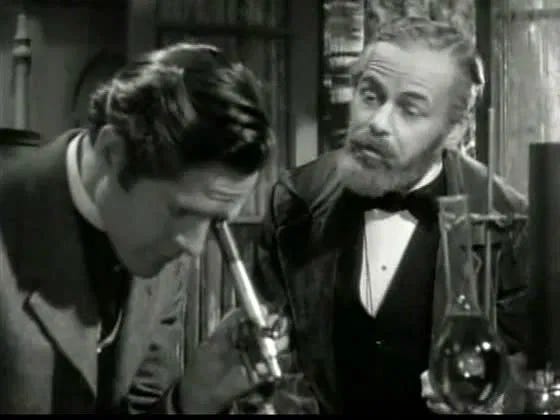
I have recently watched The Story of Louis Pasteur, a 1936 movie about, well, Louis Pasteur. I am not sure I recommend it artistically. It’s weirdly paced and its occasional gestures towards characterization only make it more obvious how much everyone in the story is a cardboard cutout. However, I have never seen a more effective altruist movie in my life.
The Story of Louis Pasteur is about three primary incidents in the life of Louis Pasteur: his discovery that childbed fever is spread when doctors don’t wash their hands or sterilize their instruments; his invention of a vaccine for anthrax; and his development of a treatment for rabies.
It is difficult to express in words how profoundly pro-science The Story of Louis Pasteur is. Louis Pasteur keeps broodily delivering dialogue like “The benefits of science are not for the scientist. The benefits of science are for humanity.” At one point, the plot is paused for several minutes to provide exposition about exactly how anthrax works. One of the most suspenseful sequences in the movie is Pasteur performing a randomized controlled trial.
The Story of Louis Pasteur has faith in the ability of humans to make the world better through science. Pasteur rages about how women are being killed by their doctors. Early on, a minor character attributes a woman’s death in childbirth to Providence. Pasteur responds angrily, “Providence! No! Ignorance!” Conversely, a villain says, “that question is beyond the scope of science! When you ask questions of 'how' or 'why' I must refer you to the theologian." Accepting things as they are without trying to change them, believing that we must be humble and accept the limits to what humans can know: the Story of Louis Pasteur thinks these are unambiguously villainous behaviors.
The Story of Louis Pasteur is healthily suspicious of scientific experts. Doctors explain that it is the nineteenth century and they are modern and advanced, not superstitious witch doctors. So obviously they can’t wash their hands! Pasteur tests his beliefs against reality, not against scientific consensus. It isn’t that the scientific consensus is wrong about everything—they eventually come to accept Pasteur’s ideas—but you must not let what is popular displace what is true.
I am also impressed by the Story of Louis Pasteur’s modeling of good reasoning techniques. I mentioned the randomized controlled trial above, but there are more examples.
The absurdity heuristic is clearly established to be sometimes misleading. Doctors make fun of Pasteur for saying boiling your instruments prevents disease—he’ll be suggesting boiling your patients’ blood next! Even claims that seem strange or even impossible, the movie shows, can nevertheless be true.
The Story of Louis Pasteur valorizes changing your mind. Pasteur doesn’t humiliate his rivals: instead, when he triumphs, they admit that they were wrong.
It also explores reasoning under uncertainty and Copenhagen ethics. Pasteur has a treatment that may work for rabies, and a desperate mother has brought him her rabies-infected child. Without treatment, the child will certainly die. But if Pasteur treats him and the child dies anyway, he could be put in prison or even executed. After much internal conflict, he treats the child.
But perhaps the most effective altruist aspect of this movie is that it is a passionate hagiography of the concept of preventative health interventions. The most striking example is the title card which appears part of the way through act one:
1870
THE FRANCO-PRUSSIAN WAR
WHILE MEN FOUGHT AND KILLED ONE ANOTHER, PASTEUR WAS FIGHTING MICROBES—THE REAL ENEMY OF ALL MANKIND.
Later, Pasteur’s treatment of his rabies-infected patients was delayed because the hospital demanded the approval of the medical facility. Three people died, and it is perhaps too late to save the others. But as the stirring music swells, Pasteur says, “if we can save even one of them it is not too late.”
The entire movie is like this.
In far too many movies, the hero is heroic because they are very good at murder. They are, presumably, murdering the correct people, the people who deserve to be murdered; but the mark of their heroism is still their ability to deal out death. Pasteur is heroic because he deals out life. He is courageous; he endures in the face of ridicule and despair; he refuses to give up. And we know that he is a hero not because there is a villain who would otherwise be alive who is dead, but because there is a child who would otherwise be dead who is alive.

I enjoyed the radio version (complete with old school ads). It's in public domain - so I removed the noise and uploaded it here.
Upload it to Wikimedia Commons!
It's already on the Internet Archive, in the future - if all goes well - a bot will scrape it, and then it will be denoised automatically by our audio players.
But I've linked it at Wikipedia.
This review is great and has gotten a lot of my friends excited about science and being a human. Just watched the movie last night, absolutely loved it.
Thanks for sharing the review, Ozy. I picked the movie for a watch party and everyone loved it! It touches on so many topics relevant to EA, definitely worth watching. And it aged really well, some scenes are very sweet and touching.